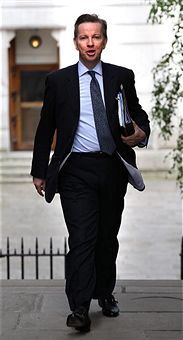 Michael Gove’s free schools programme has been heralded as the cutting edge of the
coalition’s structural reform programme. Removing the dead hand of the state and allowing new schools to emerge makes the Big Society project tangible at least. But already – and
unsurprisingly – the reforms are running into difficulty.
Michael Gove’s free schools programme has been heralded as the cutting edge of the
coalition’s structural reform programme. Removing the dead hand of the state and allowing new schools to emerge makes the Big Society project tangible at least. But already – and
unsurprisingly – the reforms are running into difficulty.
By the end of the summer, only 62 schools had applied for “free school” status. They will all be run on a not-for-profit basis. Perhaps, just perhaps, this is the start of a cascade. But it’s doubtful. If you want real innovation and improvement in the educational sector, people need to be able to make money out of it. That would surely bring about a flood of exciting, new entrants to the market.
The government is opposed to profits to be made from the running of schools. If, as an entrepreneur, you have the ability to establish and run a chain of hotels or hamburger restaurants, you can become a millionaire. If, however, you have the aptitude to oversee and organise the successful education of hundreds or thousands of children, you’re expected essentially to do this out of the kindness of your heart. A “management fee” can be levied for the work you do, but this isn’t quite the same thing.
New analysis published today by the Institute of Economic Affairs shows the urgent need to fully embrace the profit motive in education. Once again, the Swedish model is instructive. There, for-profit schools account for 13 percent of the total (in equivalent terms, this would mean over 3,000 such institutions in the UK). They have helped drive competition and therefore standards across the board. And they have produced particularly exceptional results amongst lower socio-economic groups. In leafy, middle class suburbs, there may be enough parents willing to club together to organise new schools as a philanthropic act – but this is less likely in deprived, inner city areas, the very places which need the biggest boost in educational improvement.
The government seems to think that profit is a dirty word when it comes to education. While philanthropy and public spiritedness have a key role to play in improving society, they are not enough. My fear is that Michael Gove has fallen for the myth that profit is synonymous with exploitation. The truth is that the profit motive is a central driving force behind improving the human condition – and what better way to make yourself rich than by contributing to the education of our children?
Mark Littlewood is Director General of the Institute of Economic Affairs






Comments